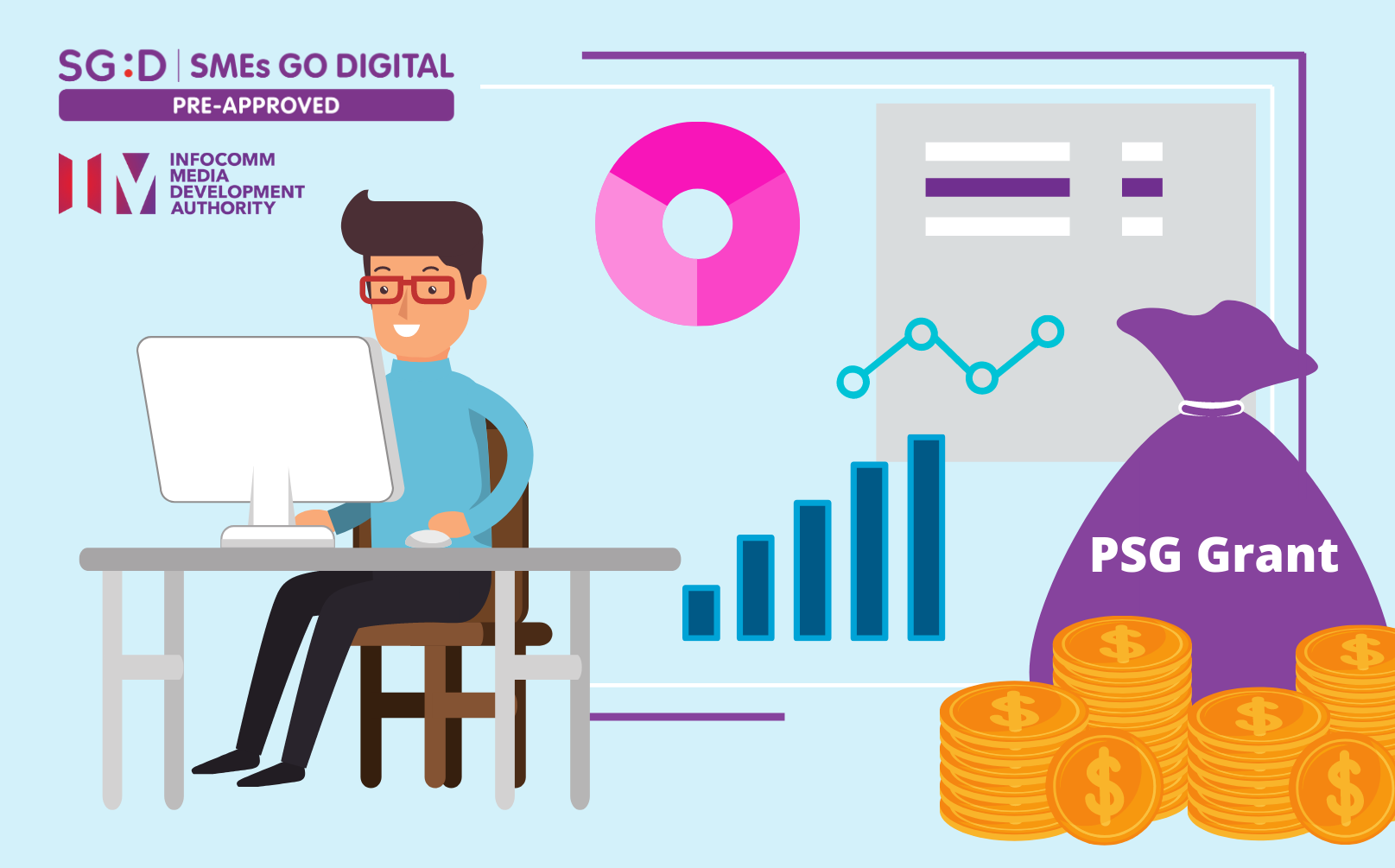Note: This blog post was updated on 21 June 2020 to reflect the most up-to-date information available.
Taking on an ERP (Enterprise Resource Planning) project is always exciting (if a little nerve-wracking), but the road to getting started is often paved with obstacles.
One big hurdle? Setting a budget aside for ERP software, particularly for smaller SMEs.
GETTING ERP? LEARN THE 4 STARTER QUESTIONS TO ASK BEFORE BUYING AN ERP SYSTEM HERE
Fret not – there’s plenty of help available. We chatted with two Enterprise Development Grant (EDG) experts, and asked them to share their top tips on scoring a government grant for your next ERP implementation.
Foo Ming Tay | Goshen Consilium


1. What Are Some Common Grant Misconceptions You've Encountered?
“People tend to think of grants as “free cash” – when applying for a grant, they focus more on how to get a slice of the pie rather than implementing something truly useful for their business. The mentality is: there’s free cash to take, we’d be silly not to grab it!
In fact, they’re short changing themselves. This is a very short-term view, and limits the benefits that can actually be obtained by having the right intentions.
Instead, they should perform proper business planning first, and focus on how their desired solution can change their business. That way, the “free cash” obtained will multiply itself many times over.”
2. What Do Government Agencies Look For In A Good Application?
“Before applying for the EDG, you should check whether your solution is available in the Productiviey Solutions Grant (PSG), because the cost of implementation is lower and the application process is shorter. Speak with a PSG pre-approved vendor first if you've yet to do so.
On the other hand, if you've done so already and found out that the PSG is not suitable or sufficient to meet your business needs, you'll have to include the reasons why this is the case when submitting your application proposal for the EDG through the Business Portal.
When applying for the EDG, there are a few questions to keep in mind. Will the solution help you:
- Reduce cost?
- Produce faster?
- Utilize resources/capital more efficiently?
- Provide wage increments for your employees?
- Carry out job redesign and provide more value for your business?
- Provide new employment opportunities, especially for high value-added positions?
The more often you can answer 'yes' to these questions, the more likely it is that your application for the EDG will be successful.
There's often the fear that automation will result in job losses – but that really isn’t the intention. What employees may not realise is that the government isn’t saying they don’t want to rely on people any longer. Rather, they want to free manpower up to pursue higher value-added activities instead of being tied up in manual work all the time.
Take cues from government agencies’ Technology Roadmaps, which push digitisation, and the use of technology such as Big Data and analytics to automate as much as possible.
And because of the increase in businesses acquiring remote working capabilities due to the COVID-19 pandemic, the government is bringing forward the transition of the economy to Industry 4.0
So if your solution is 5G-capable or can be made 5G-ready, or is an e-Commerce solution that can enable online retail for your business, it will increase your chances of a successful EDG application as well.
A good application should explain not why you want the solution, but why you need it to improve your business, and the positive impact it will have on your workforce.
And if you can show in your application that your business has a plan to adopt new workflows and training components along with the implementation, acquire working knowledge and capabilities, and eventually become self-sufficient in the usage of the solution, it will be more likely to be approved as well.”
3. Can You Share Your Best Must-have Advice/Tips?
“Business owners often, if not always, undervalue the role of a consultant – they often think, “why pay for a middleman when I can do it myself for free?”. They’re not wrong. Of course, you can submit claims on your own. But having a consultant to guide you along will shorten the process drastically.
Bigger projects are naturally more complex, and obtaining grants for them is therefore also more difficult to do.
For example, we helped an F&B business with multiple outlets that required a centralised ERP (Enterprise Resource Planning) system, a POS (Point of Sale system), and a rewards program to top it all off. Another business wanted to acquire technology from another country and have it built into their business in Singapore, to transform their internal workflows.
Submitting a claim for projects like these go far beyond a claim for more simple equipment or out-of-the-box accounting software.
A consultant with many years of experience will know what productivity indicators need to be calculated and presented to justify the current state of your company, and the desired, improved state of your company after implementing your chosen solution.
The right consultant will frame your application with an emphasis on desired benefits, rather than going into the nitty gritty, technical aspects.
A well-written business plan requires minimum clarification from the government agency. Every clarification made takes you about 10 days to finetune your submission, and upon resubmission, will take about 3 to 4 weeks to hear back from Enterprise Singapore (ESG) again. Multiple cycles of this can be avoided by engaging an expert.”
Kellin Chan | OIG International


1. What Are Some Common Grant Misconceptions You've Encountered?
"SMEs are often deterred from applying for grants because they think the entire process is too complicated. This might have been the case in the past, but there’s plenty of information available online now that makes application much easier.
Having said that, consultants continue to play an important role in advising businesses to scope their required consultancy work and proposal preparation for their grant application.
There's a misperception that the appointed consultant should do everything from A to Z, and is fully responsible for maximizing your chance of getting a grant. Rather, the applying company should take more ownership, and understand the objectives and procedures for your application. For example, a consultant cannot create a future business discretion plan for your company - it has to come from you.
This is crucial, especially with the government agencies involved - if they feel that the company is not genuine and attentive in their preparation; did not match the qualifying criteria; or did not submit the appropriate project scope, their application process could be challenging for them.
To help you prepare better, ESG has a comprehensive website stating the full details of all required documents, templates and procedures for the grant application.
There may be consultants out there who claim to do "everything" for you, or "guarantee" a successful application, but you should be wary of such promises.
The consultant should focus more on preparing the consulting scope with reference from your Project Proposal as required for the application.
2. What Do Government Agencies Look For in a Good Application?
"There are three main things to look at when preparing an application: the qualifying criteria, filling up the Project Proposal (template provided by ESG), and preparation of all required financial reports (as listed on the ESG pre-application website for the EDG application checklist).
Your company should ensure that all required documents are duly prepared by looking through the available online resources on ESG's website to ensure that the preparation checklist is fulfilled diligently. Many times, applications are delayed due to incomplete paperwork.
From the government's perspective, they're interested to know how prepared you are in terms of business direction and resources planning. The company has to be practical in terms of its readiness and resources available to finance the whole project; not just the consultancy fees, but also the implementation cost for the stated project.
Be realistic with your projection, especially for both the qualitative and quantitative outcome; they have to be aligned with your objectives and scope of the project."
3. Can You Share Your Best Must-have Advice/Tips?
"You must be very clear with your company's goals and objectives - i.e., the reason why you want to embark on this project. There are some suggested answers and pointers provided on the Project Proposal template to assist you with your preparation.
These goals and objectives will become much clearer once you pen it down by going through it with your team. Take some time to ensure that all questions are answered, and get the respective personnel to be involved in the project proposal writing.
Do have some due diligence - there's a lot of information available on the respective government websites. Spend some time reading them and understand their requirements accordingly.
If you're confused or overwhelmed by the amount of information available, a consultant will be able to assist you by providing you with the direct links to information most relevant to you, aligning the project scope with your project proposal, or explain any jargon you may encounter.
The whole application submission will be done online via the Business Grants Portal with your CorpPass. ESG might usually take 8-12 weeks (from the date you submit your project application) to process your application, they might contact you as and when for any clarifications or missing documents.
Be very familiar with the project scope that you've worked out with your consultant, so that ESG can better understand the objectives of your application, and how the scope outline is relevant for the respective grant.
One important point to note - ESG only supports new projects, i.e. the company has not signed the contract, started any work, nor made any payment to the consultant at the point of the grant application.
Upon their successful submission of their application, they can double-check with ESG if they can proceed to start with the project; or they can wait for the final approval (Letter of Offer) from ESG if the grant is awarded.
All in all, do make sure that you have the right intentions before you apply for a grant - treat it as a long term investment and a good amount of savings for your company. Have a positive mindset to lead your team and be proactive by referring to the various self-help resources online. When all this comes through, you'll have a much smoother application process."
Check Out How You Can Apply For The EDG And Other Government Grants Here.
Need advice on your upcoming ERP software project? Consult a member of the AFON team to get started! Alternatively, check out The Ultimate SME Guide to ERP Systems below -- it's free!




